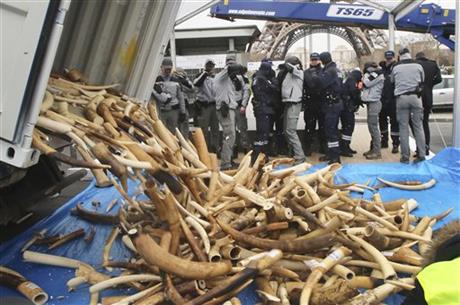
By LORI HINNANT
French Customs employees protect themselves from fragments as about 698 elephant tusks are unloaded before being crushed into dust, at the foot of the Eiffel Tower in Paris, Thursday Feb. 6, 2014. France is crushing more than 3 tons of illegal ivory in Europe’s first destruction of a stockpile of the banned elephant tusks. Thursday’s pulverization is intended to send a message to poachers and traffickers that preservationists hope will help stem the illicit trade that endangers the species’ survival. (AP Photo/Remy de la Mauviniere)
France Ivory
A carved elephant tusk, center, lies among about 698 elephant tusks, before being crushed into dust, at the foot of the Eiffel Tower in Paris, Thursday Feb. 6, 2014. France is crushing more than 3 tons of illegal ivory in Europe’s first destruction of a stockpile of the banned elephant tusks. Thursday’s pulverization is intended to send a message to poachers and traffickers that preservationists hope will help stem the illicit trade that endangers the species’ survival. (AP Photo/Remy de la Mauviniere)
France Ivory
French Customs employees unload a collection of elephant tusks, prior to crushing them into dust, at the foot of the Eiffel Tower in Paris, Thursday Feb. 6, 2014. France is crushing more than 3 tons of illegal ivory in Europe’s first destruction of a stockpile of the banned elephant tusks. Thursday’s pulverization is intended to send a message to poachers and traffickers that preservationists hope will help stem the illicit trade that endangers the species’ survival. (AP Photo/Remy de la Mauviniere)
France Ivory
French Customs officers examine a carved elephant tusk, before crushing about 698 elephant tusk into dust, at the foot of the Eiffel Tower in Paris, Thursday Feb. 6, 2014. France is crushing more than 3 tons of illegal ivory in Europe’s first destruction of a stockpile of the banned elephant tusks. Thursday’s pulverization is intended to send a message to poachers and traffickers that preservationists hope will help stem the illicit trade that endangers the species’ survival. (AP Photo/Remy de la Mauviniere)
Prev 1 of 4 Next
PARIS (AP) — More than 3 tons of illegal ivory seized by French customs agents was pulverized into dust on Thursday in Europe’s first destruction of a stockpile of the banned elephant tusks.
The destruction of the ivory, confiscated over two decades, was designed to send a message to poachers and traffickers that preservationists hope will help stem the illicit trade that endangers the species’ survival. Other countries doing the same recently include the United States, Gabon and China, ivory’s biggest market.
“Customs seizures can vary from one year to the other — there is a lot of evolution in it — but one thing doesn’t change, that’s the consumer appetite for ivory,” said Sebastien Tiran, a customs agent at Paris’ Roissy Charles de Gaulle airport, where the bulk of the ivory was confiscated.
In 2012, an estimated 22,000 African elephants were poached for their tusks, according to a study prepared by CITES, TRAFFIC International and the SSC African Elephant Specialist Group.
The market price of ivory is more than $1,000 a pound ($2,200 per kilogram) and has more than doubled in the past five years, said Ginette Hemley, vice president of species conservation at the World Wildlife Fund.
Hemley supports the destruction of stockpiles, saying they send a powerful signal that governments will not tolerate or profit from illegal ivory. But she acknowledged that simply destroying seized stocks will not be enough to tamp down demand, which she said has grown exponentially since 2009.
“It’s not all going to happen overnight,” she said. But Hemley said when poached ivory was first banned in 1989, it took two or three years before prices dropped dramatically, as did the number of elephants killed for their tusks.
Prices rose again beginning a decade later, driven by demand in China, and the profits began attracting attention from criminal syndicates. Critics of the stockpile destructions say they can backfire by decreasing supply and raising prices.
“These burnings of stockpiles are actually attracting more criminals into it,” said Dan Stiles, a researcher in Kenya who studies the ivory trade and is a member of the African Elephant Specialist Group. “These people are speculators. They’re banking on extinction.”
___



